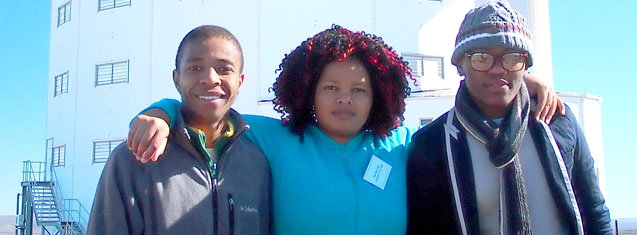Latest News Archive
Please select Category, Year, and then Month to display items
18 September 2018
Photo Hanno Otto
 The OSM Camerata is once again a winner, sharing the first prize in the Ictus International Music Competition with the Oklahoma State University.
The OSM Camerata is once again a winner, sharing the first prize in the Ictus International Music Competition with the Oklahoma State University.
If Einstein’s string theory had a musical undertone, one would think it is because of the sweet melodies of the Odeion School of Music Cameratas’ (OSMC) violins and cellos. It should therefore come as no surprise that OSMC won the 2018 International Ictus Music Competition, again. The ensemble has been paving the way to numerous successes since its inception in 2012.
This year, however, the OSMC is sharing the first prize with the Oklahoma State University Symphony Orchestra, under the direction of Dr Thomas Dickey. The OSMC’s competition recital for 2018 was conducted by principle conductor, Xavier Cloete. Acclaimed violist Elsabé Raath, joined the OSMC artistic team in 2017 as string clinician.
OSMC the jewel in crown
The OSMC is based at the Odeion School of Music (OSM) at the University of the Free State UFS) and was strategically founded as the OSM’s flagship ensemble with the main objective, creating a catalyst for excellence. “From a pedagogical perspective, it serves as a feasible incubator to nurture fully-rounded musicians who are thoroughly prepared for the demands of their trade as orchestral musicians, soloists and conductors,” said Marius Coetzee founder of the OSMC.
“Ms Raath also made her debut as conductor during the 2018 Ictus Music Competition where she conducted O Sacrum Convivium by Olivier Messiaen,” said Coetzee, founder of the OSMC. Elsabé was also conductor during the 2018 Ictus Music competition.
The OSMC’s concert programme for Ictus 2018 also consisted of works by Jacobus Gallus/Lance Phillip, Béla Bartók, Peteris Vasks/Keith Moss, as well as Johann Sebastian Bach.
Ictus an ideal platform
The Ictus International Music Competition is an online music competition for wind bands, orchestras and solo trumpet. It has been described by David Bilger of the Philadelphia Orchestra as “democratising music competitions”. Ictus was founded to make international music competitions more accessible though eliminating prohibitive travel costs, conference fees and visa issues. This was made possible through having the application and adjudication take place online only.
You can listen to OMSC Ictus submissions here:
Duo Seraphim Jabobus Gallus/Lance Phillip
Romanian Folk Dances/ Román népi táncok Béla Bartók
Kekatu Dziesma (Carnival Song) Peteris Vasks/Keith Moss
Students attend prestigious National Astrophysics and Space Science Programme
2014-08-22

From the left are: Thokozane Ngcongwane with Mbali Xaba and Thabo Kumalo (both third-year Physics and Chemistry students).
Three students from our Qwaqwa Campus – Thokozane Ngcongwane, Mbali Xaba and Thabo Kumalo – were recently selected to attend the prestigious National Astrophysics and Space Science Programme (NASSP). The programme – in partnership with the National Research Foundation (NRF) – ran for two weeks at the South African Astronomical Observatory (SAAO) in Cape Town.
The project targets students from formerly disadvantaged institutions of higher learning, where astronomy and astrophysics are not offered.
Students are invited to apply for the programme, with emphasis placed on students majoring in mathematics and physics. Students from other fields are also invited to apply, though. The programme allows for the development of black astronomers and astrophysicists, which are in demand in the ever-growing environment of astronomy in South Africa.
“Topics such as gravitational lenses, black holes, stellar evolution and the mysteries of cosmology were presented and students were invited to engage with the speakers during and after the presentations,” said Ngcongwane, a third-year Zoology and Entomology student.
The programme challenged them to work on basic astrophysical concepts in groups while individual written assignments were part of the learning process as well.
“Given the lack of information about the complexities of astronomy the students had, this was the most ideal time to learn about all matters astronomy and astrophysics as lectures offered a lot to young and excited minds,” Ngcongwane said.